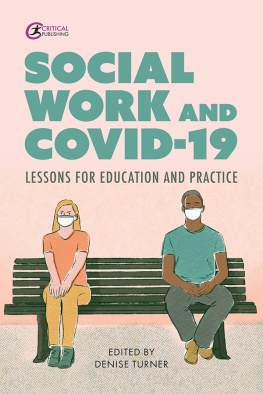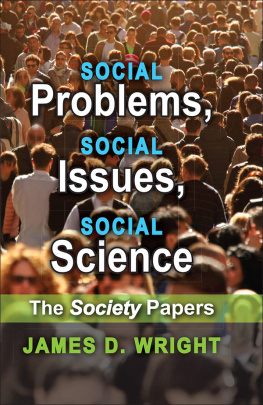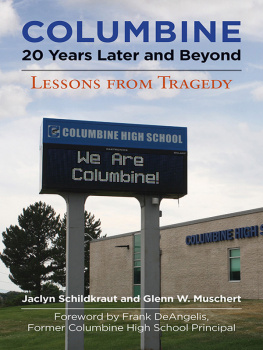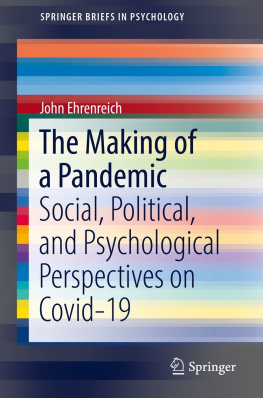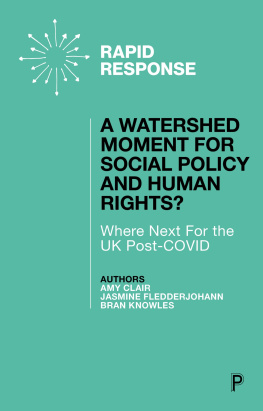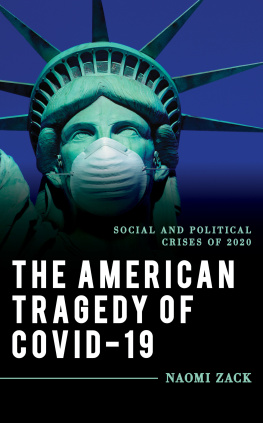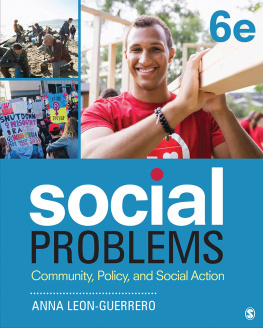Social Problems in the Age of COVID-19
Volume 2: Global Perspectives
Edited by
Glenn W. Muschert, Kristen M. Budd, David C. Lane, and Jason A. Smith
First published in Great Britain in 2020 by
Policy Press, an imprint of
Bristol University Press
University of Bristol
1-9 Old Park Hill
Bristol
BS2 8BB
UK
t: +44 (0)117 954 5940
e: bup-info@bristol.ac.uk
Details of international sales and distribution partners are available at
policy.bristoluniversitypress.co.uk
Bristol University Press 2020
British Library Cataloguing in Publication Data
A catalogue record for this book is available from the British Library
ISBN 978-1-4473-6061-2 ePub
ISBN 978-1-4473-6062-9 ePdf
The right of Glenn W. Muschert, Kristen M. Budd, David C. Lane and Jason A. Smith to be identified as editors of this work has been asserted by them in accordance with the Copyright, Designs and Patents Act 1988.
All rights reserved: no part of this publication may be reproduced, stored in a retrieval system, or transmitted in any form or by any means, electronic, mechanical, photocopying, recording, or otherwise without the prior permission of Bristol University Press.
Every reasonable effort has been made to obtain permission to reproduce copyrighted material. If, however, anyone knows of an oversight, please contact the publisher.
The statements and opinions contained within this publication are solely those of the editors and contributors and not of the University of Bristol or Bristol University Press. The University of Bristol and Bristol University Press disclaim responsibility for any injury to persons or property resulting from any material published in this publication.
Bristol University Press and Policy Press work to counter discrimination on grounds of gender, race, disability, age and sexuality.
Contents
Corey W. Dolgon, Stonehill College
Glenn W. Muschert, Khalifa University of Science and Technology; Kristen M. Budd, Miami University; David C. Lane, Illinois State University; Jason A. Smith, Kaiser Foundation Health Plan
Brittany Keegan, Virginia Commonwealth University
Arnaldo MontAlvao, Iowa State University; Pamela Aronson, University of Michigan-Dearborn; Jeylan Mortimer, University of Minnesota
Bradley W. Williams, George Mason University
Theresa Rocha Beardall, Virginia Tech
Nikhil Deb, Murray State University; Maya Rao, University of Tennessee
Yvonne A. Braun, University of Oregon
Reema Sen, Case Western Reserve University; Brian Gran, Case Western Reserve University
Ninette Rothmller, City University of New York (CUNY)
Alex Oteino, Arcadia University
Kristy Kelly, Drexel University
End Matter
Tatiana Karabchuk, United Arab Emirates University
Michael Adorjan, University of Calgary
This rapid-response volume has come to fruition due to the effective cooperation and support of so many people. We, the editors, wish to thank our authors, first, for working with us under short deadlines, and for leveraging their academic expertise and insight to provide high-quality chapters. It is a pleasure to work with such a group of professionals to fill the need in society for rigorous knowledge regarding the impacts of the COVID-19 pandemic on real people and societies more generally. We acknowledge the support of Justice 21 Committee member Michelle Christian and Robert Perrucci, who founded the committee. We are indebted to Michele Koontz and Hctor Delgado of the Society for the Study of Social Problems (SSSP) administrative and executive offices, respectively, for their support and encouragement. We thank acquisitions editor Victoria Pittman and her team at Policy Press, with whom we have been pleased to collaborate on this rapid-response book. Finally, we thank all our fellow students, scholars, practitioners, and activists who make the SSSP such an exciting environment in which to study, research, write, and undertake meaningful social action. Even in the midst of a pandemic which has disrupted nearly all areas of mundane life, our colleagues remain dedicated to providing rigorous public sociology.
Finally, this volume is dedicated to the selfless healthcare workers who have been humanitys frontline in responding to the pandemic; to those who have suffered directly and indirectly from the loss of family, friends, colleagues, and community members; to the most vulnerable among us who have borne the brunt of the pandemic and subsequent lockdowns; and to all those who serve without fail worldwide to provide stability in the face of substantial disruptions in social systems, including workers in education, transportation, groceries, pharmacies, and official agencies.
The Society for the Study of Social Problems (SSSP) was founded by social scientists who wanted to use their research, scholarship, and teaching to make the world a better place (Galliher and Galliher, 2001; Kolb, 1954). Debating the best strategies and practices for achieving this goal have remained a significant part of the organizations history.
SSSP President David Smith (2017) challenged us to globalize our study of social problems. He accurately argued that, as American sociology evolved as a discipline to focus on society as a concept, it did so within an increasingly narrow scope and specious project. The United States and Western Europe became the prototype of society while other groupings were examined as deviant subcultures and/or underdeveloped nations. From the Chicago School (Abbott, 2017; Low and Bowden, 2013) through the structural-functionalism of Parsons Cold War nationalism (Gilman, 2003; Latham, 2011) to theories that suggested a global political and ideological consensus around Bells (1960) End of Ideology and Fukuyamas () End of History and the Last Man, all came together to produce a deeply flawed yet dominant core for social science. The seemingly seamless modernist framework nurtured American sociologists and their global cohort to develop an increasingly elite, corporate, professionalized, patriarchal, and Eurocentric enterprise under the guise of objective inquiry and scientific analysis.
The rise of anti-colonial and anti-imperialist movements in the second half of the 20th century birthed a more radical sociology that questioned the limitations of society as a concept and the triumphalism of western intellectual hegemony in general. Smith suggests, borrowing from previous SSSP President Evelyn Nakano Glenn (), that only a movement for international citizenship might offer a way to transform the exclusionary rhetoric and politics of the old liberal, modernist tradition with a more international, yet still liberal, narrative of global citizenship and human rights. For sociologists to support such reform movements and fulfill the SSSP mission, Smith and Glenn both concluded that we needed to be more global.
Smith and Glenn are right about sociology. But their analysis still begins with the Chicago Schools Eurocentric, nativist modela modernist intellectual framework for an elite white discipline. While both SSSP presidents recognized the foundational flaws of this approach (Smith promoted a Marxist critique of capitalism and Glenn the work of critical legal studies in deconstructing the inherent racial supremacy of citizenship narratives), they still recast liberal sociology in ways that left intact the barbarism of the original fallacycapitalist exploitation, settler colonialism, environmental degradation, and white supremacy. The possibilities of a more radical analytical project engaged in challenging these forces get squelched when limited by the professional conventions and traditional models. It is one thing to suggest rethinking the economic and political structures of contemporary society to see how our scholarship might analyze them and promote change. It seems quite another to suggest a radical sociological project whose global perspective dismantles the very disciplinary foundations of the enterprise and suggests restructuring and reparations must be a baseline.



